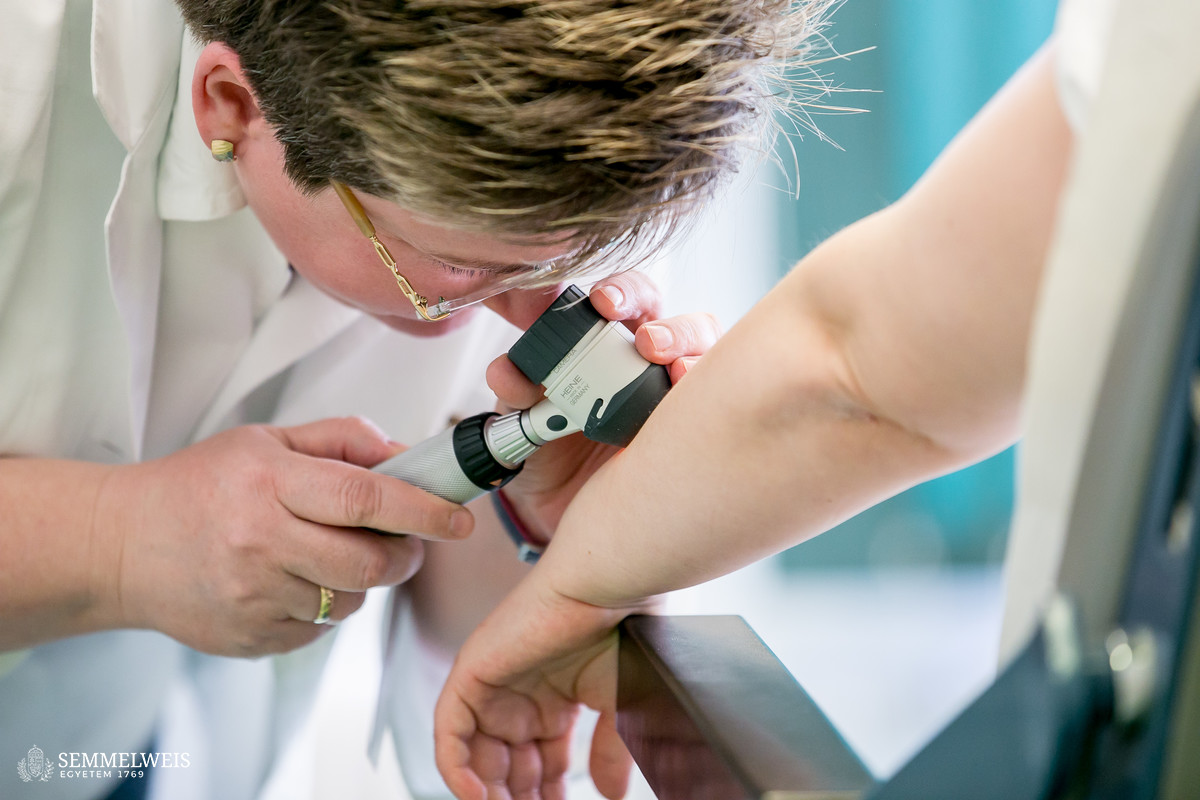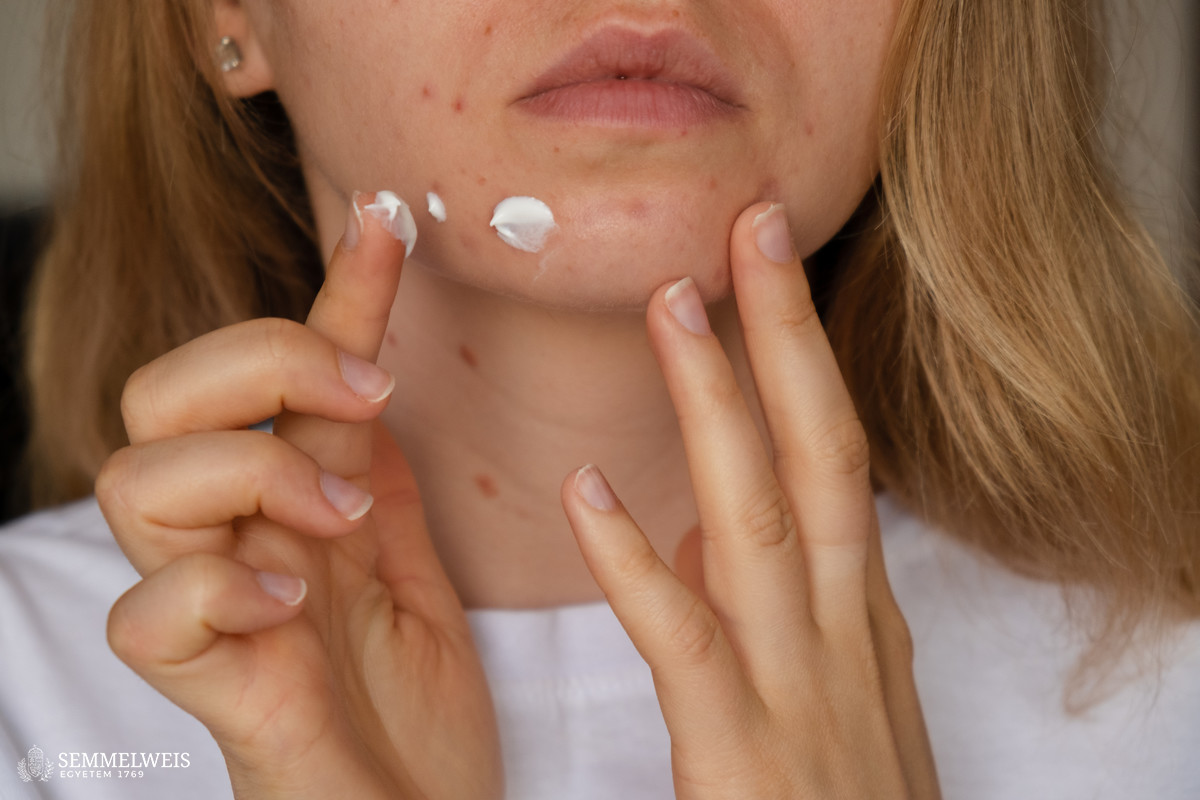1. Examine your skin every month and have your birthmarks checked annually.
 Protecting the health of your skin is essential not only for esthetic reasons, but also for your overall health. The skin is the body’s largest organ, covering 1.5 to 2 square meters, and is the first line of defense against external influences. When the skin is healthy, its layers work in harmony to provide protection. According to Dr. Péter Holló, Head of the Department of Dermatology, Venereology and Dermatooncology, one of the most important things is to be attentive and monitor the condition of and changes in your skin: If any new lesions appear, you should consult a dermatologist. Birthmark screening is strongly recommended for everyone every year, regardless of skin type and number of moles, he adds. Regular self-examination is important: It is worth checking the birthmarks and freckles on your skin thoroughly every month. If any of them are noticeably different from the others, it is worth showing them to a dermatologist. Changes in color, shape, and size, an asymmetrical appearance, prominent details or bumps, itching, or a wound that does not heal easily are all warning signs.
Protecting the health of your skin is essential not only for esthetic reasons, but also for your overall health. The skin is the body’s largest organ, covering 1.5 to 2 square meters, and is the first line of defense against external influences. When the skin is healthy, its layers work in harmony to provide protection. According to Dr. Péter Holló, Head of the Department of Dermatology, Venereology and Dermatooncology, one of the most important things is to be attentive and monitor the condition of and changes in your skin: If any new lesions appear, you should consult a dermatologist. Birthmark screening is strongly recommended for everyone every year, regardless of skin type and number of moles, he adds. Regular self-examination is important: It is worth checking the birthmarks and freckles on your skin thoroughly every month. If any of them are noticeably different from the others, it is worth showing them to a dermatologist. Changes in color, shape, and size, an asymmetrical appearance, prominent details or bumps, itching, or a wound that does not heal easily are all warning signs.
2. Sun protection: filtering UV rays is important all year round and essential in summer.
Even a single case of sunburn in summer can significantly increase the risk of skin cancer, but the damaging effects on skin cells and DNA accumulate over the years, even if they did not cause visible and lasting changes in youth. According to WHO estimates, 80 percent of the UV exposure we accumulate during our lifetime occurs in childhood (as children generally spend more time outdoors). Therefore, the importance of sun protection cannot be overemphasized or repeated often enough, for both children and adults, says Dr. Péter Holló. Even in cloudy weather, it is important to protect yourself from the harmful rays of the sun: It is best to cover your skin with clothing, and nowadays there is excellent UV-protective sportswear available, even for water sports. Cover your head with a cap or hat, and it is also important to protect your eyes by wearing sunglasses. In addition to these, the use of high-factor (50+) sunscreen is also essential. You should apply sunscreen not only when going to the beach, but also during any outdoor activity, and even before leaving for work, the expert recommends. Tanning is part of the body’s natural defense mechanism: The skin reacts to ultraviolet radiation by producing melanin to protect cells from damage. However, tanning only provides a small amount of protection against late skin damage caused by UV radiation, so it is a misconception that if you already have a base tan, you need less sun protection.
3. Proper skin care: read product labels and use products that are appropriate for your age.
Dr. Péter Holló also emphasizes that proper skin care is significant at all ages. It is important to know your skin type – dry, sensitive, oily, acne-prone, etc. – and choose preparations accordingly. If you have no particular complaints, a beautician can help you with this, and in the case of specific skin problems, you can also consult a dermatologist. Moisturizing creams, for example, are beneficial for the skin at any age. The expert adds that it is unnecessary to use various “rejuvenating” products before wrinkles appear, as they will not prevent the aging process either. It is worth starting to use the currently popular dermocosmetic products containing hyaluronic acid when the skin needs to replenish the appropriate amount of connective tissue because before that, the body produces it itself. According to Dr. Péter Holló, it is advisable to read product labels, which contain a lot of useful information about the ingredients and proper use, and it is also worth paying attention to the expiration date. Regarding acne and spots, which affect a lot of people, the head of department says that in milder cases, professional cleansing by a beautician is sufficient, but in cases of large numbers of inflamed, pus-filled acne, it is better to consult a dermatologist because they can prescribe preparations that can completely eliminate the symptoms and prevent or heal permanent scarring.
Esthetic procedures are becoming increasingly popular around the world. Importantly, procedures affecting the deeper layers of the skin (e.g. Botox, lip augmentation) can only be performed by a doctor with the appropriate expertise. Anyone who wants to undergo such a procedure should definitely see a doctor, otherwise they run a serious risk.
4. Our diet and lifestyle also affect our skin – make sure you eat foods rich in vitamins and get enough sleep.
An unbalanced diet, too little exercise or a complete lack of sport, stress, lack of sleep, smoking, dehydration, and certain medications all affect the skin and its protective barrier function. Processed foods should be avoided. A diet rich in antioxidants has a beneficial effect on the skin: vitamins A, C, and E; zinc; selenium (found, e.g., in carrots, citrus fruits, nuts, or green leafy vegetables); and omega-3 fatty acids (which are found in fish, flaxseed, and walnuts, for example) as they improve the skin’s elasticity. Drinking 2 to 2.5 liters of water a day helps keep your skin and whole body hydrated. Getting 7 to 9 hours of sleep a night supports the regeneration of your skin. Chronic stress exacerbates skin problems (e.g. acne, eczema, psoriasis), smoking reduces the oxygen supply to the skin and accelerates aging, and alcohol dehydrates and damages the skin’s structure, so it is best to avoid these. Chocolate and oilseeds can worsen acne-prone skin because they increase sebum production, adds Dr. Péter Holló, who also says that one of the most common dermatological complaints, eczema, often occurs as an allergic reaction after consuming certain foods or coming into contact with chemicals.
5. Skin symptoms can be an indication of diseases of other organs, even serious internal medical conditions, so pay attention to your body’s signals.
Dr. Péter Holló mentions that many organ diseases can cause various symptoms on our skin, which is why it is worth paying attention to its condition and signals. There are so many skin symptoms associated with internal diseases that several books have been written on the subject. To mention just a few examples, he highlights metabolic diseases, including diabetes, which manifests itself on the skin in the form of characteristic symptoms such as so-called “diabetes spots” (brownish, round, slightly sunken spots, mainly on the lower legs), blisters, and leg ulcers. Acne and excessive hair growth may indicate a hormonal gynecological disorder called PCOS (polycystic ovary syndrome), but inflammatory bowel diseases also cause characteristic skin symptoms such as abscesses, ulcers, and lumps. In cases of gluten intolerance, it has also been observed that those affected may develop itchy blisters, eczema, or psoriasis on their skin, symptoms that disappear when gluten is eliminated from the diet. Dr. Péter Holló emphasizes that it is advisable to consult a specialist as soon as possible if any unusual skin changes occur, as this is the only way to determine the underlying cause of the problem and the recommended treatment: whether a cream is sufficient or a more serious examination is required.
In summer, it is also worth paying close attention to the medication you take, as hundreds of preparations can cause photosensitivity and even serious skin symptoms, while other medications can have an adverse effect on the body’s heat regulation. Antibiotics, antifungal agents, heart and diabetes medications, diuretics, painkillers, and psychiatric drugs are all groups of medications that require special attention in the summer because they can cause photosensitivity reactions.
Eszter Keresztes
Translation: Dr. Balázs Csizmadia
Photos by Bálint Barta, Attila Kovács, Boglárka Zellei – Semmelweis University
Illustration: iStock





